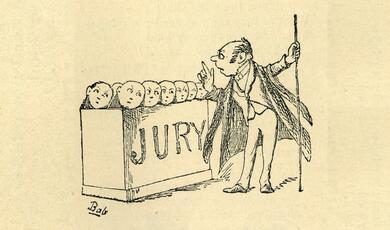The Human Rights Act: Cornerstone of a New Constitution
Share
- Details
- Text
- Audio
- Downloads
- Extra Reading
The Human Rights Act of 1998 gives us, in effect, a Bill of Rights. But what is a Bill of Rights and how is it likely to operate in practice? Is it likely to lead to a conflict between the judges interpreting our rights and Parliament which legislates on rights?
Download Text
THE HUMAN RIGHTS ACT: CORNERSTONE OF A NEW CONSTITUTION
Professor Vernon Bogdanor
A highly topical issue. You have probably read about the ban on hunting which is being challenged in the courts on the grounds that it violates the rights of those involved in the hunting industry; and the decision made by the law lords that part of the Anti-Terrorism, Crime and Security Act of 2001, involving the detention without charge of foreign nationals deemed a threat to national security, violates the Human Rights Act. I shall discuss this latter case at the conclusion of the lecture.
1. The principle of the sovereignty of Parliament is the cornerstone of the old constitution. This means, first, that Parliament can do anything it likes. Parliament, it was said, can do anything except turn a man into a woman and woman into a man. BUT – if Parliament says that a man is a woman, then, from the point of view of the law, a man is a woman!
2. It means, secondly, that there can be no law superior to Parliament – no higher law. As we saw in my last lecture, this poses particular problems for our membership of the European Union. For the European Union conceives of itself as being a legal order superior to that of the member states, whose legal orders are subordinate to it. Thus, to take an extreme example, it would not, from the point of view of the European Union, be legal for Parliament to impose a tariff against French goods. It would, however, be legal from the point of view of Westminster, since Parliament can do anything it likes! This is a dilemma which has not yet been resolved.
3. The principle of the sovereignty of Parliament also poses problems for the protection of human rights. For the principle of the sovereignty of Parliament means, thirdly, that the courts cannot strike down legislation which conflicts with human rights. This is a great contrast to the situation in the United States, and indeed to many other democracies. In the United States, the Supreme Court can strike down any legislation which is contrary to the constitution, and the constitution includes a Bill of Rights.
4. `Bill of Rights’ is the name normally given to the first ten amendments to the American constitution, which were ratified at the same time as the constitution itself. More generally, a Bill of Rights is a charter which lists the rights of the citizen. These rights are specially protected, since they can normally only be changed by some special procedure, more difficult than the procedure for the amendment of non-constitutional legislation.
EXAMPLE. The First Amendment to the American Constitution. The First Article of the American Bill of Rights.
`Congress shall make no law respecting an establishment of religion, or prohibiting the free exercise thereof; or abridging the freedom of speech, or of the press; or the right of the people peaceably to assemble, and to petition the Government for a redress of grievances’.
To alter anything in the Bill of Rights, it is not enough to pass a law through Congress by a simple majority. Instead, the consent of two-thirds of Congress is required, and also three-quarters of the American states. This is very difficult to achieve, and in fact there have only been 27 amendments to the American constitution since 1789, the first ten of which were, as I have said, passed in 1791.
In the German constitution, the basic principles in the first 20 articles cannot be amended at all. That is to prevent another Hitler subverting the constitution.
5. So, if Congress passes any law restricting, for example, freedom of speech, the Supreme Court will strike it down as being contrary to the Constitution. This is known as the judicial review of legislation. We do not have it in Britain. If Parliament were to pass an Act providing that all red-headed people should be executed next Monday, the courts could not strike it down.
6. How, then, have human rights been protected in Britain, if not by the courts? The answer that we have given in the past is that human rights depend, in the last resort, upon public opinion, as reflected in Parliament. Our rights are not derived from a constitution, but from the decisions made by Parliament; and Parliament has normally taken good care not to infringe human rights. The presumption is that the electorate is also sensitive to human rights, and will punish any government which infringes them. One hundred years ago, a writer on the British Constitution said that our constitution rested upon `tacit understandings’, although he then added that, unfortunately, the understandings were not always understood!
7. This approach – reliance on Parliament to defend human rights – is, however, nearly unique in the modern world. Almost every democracy, and almost every European democracy, has followed American practice to this extent, that they have called upon the courts to defend their rights. Germany and Austria, for example, have constitutional courts which can strike down legislation conflicting with human rights. France has a Constitutional Council which can do the same. Even Commonwealth countries, such as Canada and New Zealand, whose constitutions are, to a considerable extent, based upon the Westminster Model, now have Bills of Rights which can be interpreted by the courts.
8. WHY has this occurred. WHY is there less reliance now in most democracies upon legislatures, and a resort to judges to decide on human rights matters. There are a number of reasons.
On the Continent, there was considerable distrust of public opinion following the experience of Fascism and National Socialism. Countries which had been affected by it strengthened the role of the courts so as to guard against the intolerance of majorities. In Britain, there has been much discontent with the workings of democracy, a discontent which finds expression in widespread criticism of the operation of representative institutions. Trust in politicians in Britain is not at present very high. Traditionally, the main check on government was not the courts, but the alternation of party – the swing of the pendulum. After 1979, however, it seemed that the pendulum had stopped swinging, and there was the longest period of single-party government, under the Conservative administrations of Margaret Thatcher and John Major, since the Napoleonic wars. Opponents of the government alleged, whether rightly or wrongly, that it was subverting hitherto widely accepted conventions of the constitution, and that we were approaching what Lord Hailsham had called an `elective dictatorship’. Many on the Left, who had traditionally been suspicious of judges and the courts, were converted to a belief in the virtues of judicial control. Now we have a long period of Labour government with an opposition seemingly to weak to offer a very effective challenge. All this has led to a much greater emphasis on human rights. Moreover, Britain has become a multi-cultural soc, and this has made it more difficult but also more necessary to protect the rights of minorities who might not normally be heard in the electoral process, and to whom the majority might be hostile. Examples are members of ethnic minorities, asylum seekers, suspected terrorists. It may also be suggested that the development of a multicultural society has undermined the consensus on which the old constitution rested. People now have a more developed sense of their rights and they look to the courts to defend them. Our entry in to the European Community in 1973 has also been an important factor, because it has exposed us to other legal systems, most of which protect human rights. Moreover, as we saw in my last lecture, our courts now take account of European legislation. In 1994, the House of Lords declared that British legislation relating to part-time employees violated a European Union directive. This led The Times to comment that ` Britain may now have, for the first time in history, a constitutional court’. Devolution, too, is likely to increase the role of the courts, which may be called upon to arbitrate between Westminster and the Scottish Parliament.
9. SO – pressure in Britain to have greater protection of rights. BUT – how is this to be achieved. ANSWER – through the European Convention of Human Rights.
European Convention – nothing to do with European Union – drawn up in 1950, NOT by the European Union, which did not exist then – drawn up largely as a result of British influence. Britain was one of the first countries to ratify it in 1951.
Drawn up not by European Union but by Council of Europe, a purely intergovernmental organization.
The idea of the European Convention came largely from Britain, and, to a large extent, from Conservatives. They thought that the Continent, following the experience of Fascism and National Socialism, needed better protection of human rights. They therefore helped draw up a bill of rights which all European democracies should observe. To do this, they should make it part of their law.
We, however, could not make it part of our law, because it would conflict with the notion of parliamentary sovereignty. In 1966, however, the British government allowed individuals to petition the Court of Human Rights in Strasbourg – the Court of the Council of Europe, NOT the Court of the European Union, which sits in Luxembourg. Where the Court has ruled against the government, the government has generally agreed to amend the law accordingly.
10. BUT – it seems odd that British litigants, to secure their rights, had to appeal to a foreign court. Why should they not be able to secure their rights in a British court. The Human Rights Act of 1998 makes this possible. It does not create new rights. It merely allows the rights guaranteed under the European Convention to be secured in our own courts in Britain rather than having to secure them at the European Court in Strasbourg. It still remains the case, however, that, if these rights cannot be secured in Britain, there is a right to appeal in Strasbourg.
11. BUT – the difficulty of the Human Rights Act was that, to secure these rights in British courts, it would seem necessary that judges be given the right to strike down Acts of Parliament; and this would amount to a constitutional revolution, undermining the sovereignty of Parliament. Moreover, it is not clear that judges wanted to be able to strike down Acts of Parliament, for this would, so many thought, bring them into conflict with government and politicize them.
12. Therefore the government adopted an ingenious method, in the Human Rights Act, of compromising between the two principles of the sovereignty of Parliament and the protection of human rights.
The compromise is as follows. The Act:
Requires ministers, when introducing legislation into Parliament, to certify that, in their belief, it complies with the Convention. The courts are required to interpret ALL legislation, whether passed before or after the Human Rights Act, so that it is compatible with the European Convention of Human Rights. If legislation cannot be interpreted so as to be compatible with the European Convention, then, in England and Wales, the courts are required to issue a declaration of incompatibility. The offending statute or part of a statute is not struck down, and it remains part of the law. But Parliament is given the power to amend or repeal it and a special fast-track method is provided for this.
THUS – the sovereignty of Parliament is preserved but the courts now have greater power to protect human rights.
From the year 2000, when the Act came into force, until last summer, there were 15 declarations of incompatibility, of which 5 were overturned on appeal. Of the remaining 10, action was taken by the government or Parliament on all of them.
13. The Human Rights Act revolutionizes our understanding of rights. The traditional view, as we have seen, is that we do not believe in declarations or bills of rights. The principles defining our rights were derived from decisions made by Parliament. In the United States, by contrast, or Germany, rights are deductively derived from the constitution. In future, our rights too will be deductively derived from a constitutional document, the European Convention of Human Rights. This Convention is now a form of higher law.
CONSEQUENCES.
a. We are becoming a genuine constitutional state? Lord Steyn, `A distinctive characteristic of such a state is that it has a wholly separate and independent Supreme Court which is the ultimate guardian of the fundamental laws of the community’.
b. In consequence, the role of judges becomes more important – lions under the throne – Bacon. Courts specialists in the protection of liberty.
BUT - David Blunkett – Independent, 20 February 2003. `Frankly, I’m personally fed up with having to deal with a situation where Parliament debate issues and the judges then overturn them’.
Does the Human Rights Act substitute government by unelected judges for government by elected minister?
BUT - Are the judges out of touch. Law – lords 8 elderly white men, and one female. The judges – pale, male and stale?. One consequence of the Human Rights Act is that there will be more concern for how judges are selected. The Constitutional Reform bill, currently before Parliament, provides for the establishment of a Judicial Appointments Commission to recommend the appointment of judges. This Commission will try to secure a more diversified bench – greater representation of women and members of ethnic minorities.
The growing importance of the judiciary means that the bench will fall increasingly under critical scrutiny. It will need to become more representative of society than it is at present.
Some issues which the courts are coming to deal with – abortion, for example, or reproductive technology - affect women very profoundly, while other issues, such as race relations, affect ethnic minorities profoundly.
In 2001, Lady Justice Hale (as she then was) in the case of Parkinson v St. James and Seacroft University Hospital NHS Trust, spoke of the experience of bearing and rearing a child from a woman’s point of view. A colleague told her that her judgment could not have been written by a man.
Work by academics has shown has shown that non-white defendants were more likely to receive custodial sentences than white defendants.
The Commission for Racial Equality has cited the words of a judge in a negligence action to a litigant of Asian origin that `we English are incredibly reserved, florid language upsets us; more commonly used in other parts of the world and acceptable there’. The judge said that he had known someone who had lived in India for many years and had `read newspapers there and the language used was colourful and did not suit us over here’.
There is, therefore, increasing interest in the representativeness of the judges.
One of the qualities now needed, in our society, to be successful as a senior judge is an empathy with the problems of a multicultural society and a society in which the role of women is changing. Although these qualities are of course not exclusive to ethnic minorities or women, it is doubtful if a bench largely composed of white males is likely to prove acceptable in the long run.
I do not believe that the senior judiciary will maintain the high level of public confidence which it now enjoys unless it becomes more diversified.
TO CONCLUDE; a case study – which you may be familiar with.
A v S of S for the Home Department – December 2004.
Anti-Terrorism, Crime and Security Act, 2001.
Guardian headline – 17 December - `Judges’ Verdict on Terror laws Provokes Constitutional Crisis’.
Problem of suspected terrorists, who were not British citizens, held without trial and without charge. Can be detained indefinitely if Home Secretary believes that they are a threat to national security. Detention at the wish of the executive – Churchill - `in the highest degree odious’.
BUT – debated for only 16 hours in the House of Commons, though longer in the Lords. It received the Royal Assent in December 2001, just one month after being introduced into the Commons. Is the House of Commons really scrutinizing legislation bearing on human rights very effectively?
Law lords said that the relevant part of the Act was incompatible with European Convention rights to personal liberty and the prohibition on discrimination.
BUT – government has so far not said that it will recommend Parliament to change the relevant part of the Act. An election is looming. The government is frightened of being seen as soft on law and order.
We must remember that the defence of rights is often the defence of the rights of very unpopular minorities – suspected terrorists, bogus asylum seekers, suspected paedophiles even.
The Human Rights Act proposes a compromise. But, in the last resort, it remains the case that it is Parliament which guarantees our rights. Will it do so, when very unpopular minorities are in question? Is this compromise sufficient – or do we need to go further and to give the courts the power to determine our rights.
The Scottish Parliament which, unlike Westminster, is a subordinate and not a sovereign body, is bound by the European Convention. Thus, if the courts rule that an Act of the Scottish Parliament conflicts with the European Convention, it becomes void.
Should we follow this precedent in England and Wales. Otherwise we face the possibility that a statute may be void, as violating human rights in Scotland, while a similar statute in England remains part of the law.
Can the compromise continue?
© Vernon Bogdanor, Gresham College, 25 January 2005
This event was on Tue, 25 Jan 2005
Support Gresham
Gresham College has offered an outstanding education to the public free of charge for over 400 years. Today, Gresham College plays an important role in fostering a love of learning and a greater understanding of ourselves and the world around us. Your donation will help to widen our reach and to broaden our audience, allowing more people to benefit from a high-quality education from some of the brightest minds.


 Login
Login







